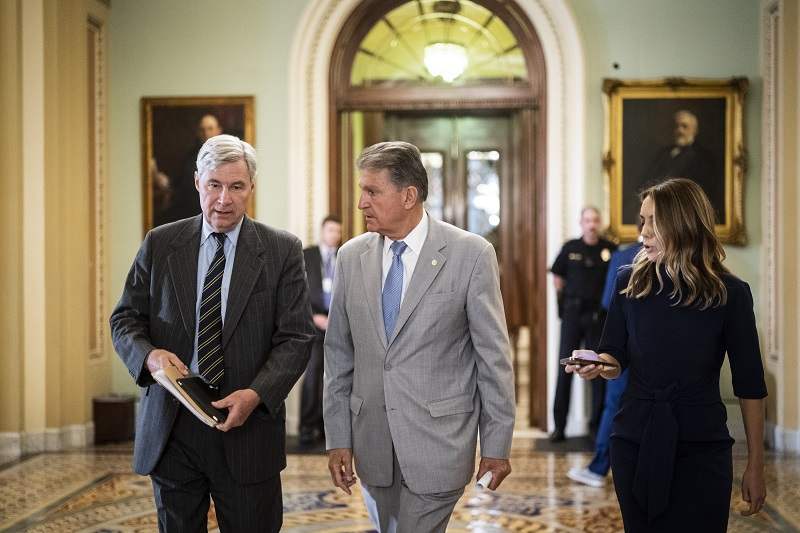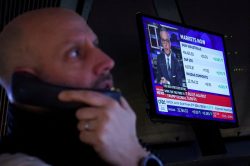
Whitehouse heads to lunch with Sen. Joe Manchin, D-W.Va., last summer.
13:07 JST, August 19, 2022
When the largest climate bill in U.S. history passed the Senate this month, Sen. Brian Schatz, D-Hawaii, choked back tears.
“This is a planetary emergency, and this is the first time the federal government has taken action that is worthy of the moment,” he told reporters at the time. “Now I can look my kids in the eye and say we’re really doing something about climate.”
For Schatz, one of Congress’s most vocal climate hawks, the moment marked the triumphant culmination of a long, treacherous effort to muscle climate legislation through the upper chamber.
“It was relief,” Schatz said in an interview. “It was a celebration of the work that everybody had done, but most importantly to me is it represented hope that the United States government can address the biggest single challenge of this political generation.”
It was “a political miracle,” Schatz added.
Schatz, 49, embodies a new type of climate hawk on Capitol Hill – one that resonates with a younger generation of climate activists determined to win buy-in not just from environmentalists but also from farmers, ranchers, Native people, labor groups, low-income communities and corporations, too. Schatz, who chairs the Indian Affairs Committee, understood that the people who are affected must be brought into the effort.
He doesn’t do it alone. He and two of his colleagues, Sens. Martin Heinrich, D-N.M., who is 50, and Sheldon Whitehouse, D-R.I., who is 66, teamed up over the past decade to craft a new model of persistent activism inside the power corridors of Congress alongside a growing climate-focused advocacy.
And they still work alongside other Democrats who have long prioritized climate, including Sen. Edward Markey, Mass., 76, who spearheaded the failed 2010 cap-and-trade effort and the Green New Deal, and Sen. Thomas Carper, Del., 75, who chairs the Environment and Public Works Committee, and played a role in crafting the Democrats’ $370 billion climate bill.
Schatz has not attracted as much attention for his climate advocacy as Whitehouse, who has delivered nearly 300 “Time to Wake Up” speeches on the Senate floor to urge legislative action on global warming. But Schatz came to the Senate with climate credentials: He asked Neil Abercrombie, Hawaii’s governor at the time, to appoint him to serve the rest of longtime Democratic Sen. Daniel Inouye’s term after Inouye’s death in 2012 because climate was Schatz’s top priority.
Schatz’s arrival gave Whitehouse, elected to the Senate in 2006 and its most vocal climate activist, a more soft-spoken partner. They began to strategize and plan to raise awareness and lay the foundation for legislation. They organized an overnight talk-a-thon on the Senate floor about climate in 2014 and introduced a bill to tax carbon emissions. Notably, moderate and vulnerable Democrats didn’t participate and the carbon tax bill didn’t go anywhere.
“This was like before everybody was worried about climate or before climate action was cool,” said Tiernen Sittenfeld, senior vice president of government affairs at the League of Conservation Voters. Sittenfeld began working with Schatz on climate days after he arrived in D.C. “This used to be a much lonelier fight in Congress.”
Heinrich, a close friend of Schatz’s who built a solar car in college and drove it across the country, made the duo a trio when he joined the Senate in 2013.
The three men come from different parts of the country that are facing different, but equally dangerous, climate disasters.
In Hawaii, sea levels have risen about 10 inches since 1950, increasing the frequency of flooding for coastal communities. In New Mexico, a stretch of the Rio Grande recently ran dry for the first time in 40 years amid a historic megadrought. And in Rhode Island, rising ocean temperatures are straining the state’s lobster industry.
They have made climate change a primary focus of their Senate careers.
“‘The Three Climateers’ [is what] we have called ourselves at various times to try and cheer ourselves up,” Whitehouse said in an interview.
In November, they all flew to the COP26 U.N. climate conference in Glasgow, Scotland. Some attendees called them the “three amigos” because they appeared inseparable and they had the same message: The United States will be a leader on climate.
The three have been meeting every week since 2019 to plan legislative and social media campaigns around climate. They would speak regularly at weekly closed-door Democratic lunches to keep climate top of mind for their caucus.
Climate change was not always a winning issue for Democrats, and even now, Democratic strategists admit that it won’t play well in every district or state in November’s midterm elections, especially in areas where the economy is reliant on fossil fuels.
The lowest point for climate advocates was in 2010, when moderate Senate Democrats facing head winds in their reelection efforts urged President Barack Obama to walk away from a major cap-and-trade bill after a bruising fight to pass the Affordable Care Act. (He did.) Little has happened legislatively on climate since then. Until now.
Slowly, the trio saw a shift in their colleagues.
Schatz said the climate movement – and the lawmakers’ persistence – transformed “an issue that used to divide Democrats into an issue that motivates and unites Democrats.”
“We reached the point in this Congress where it was a major issue for the vast majority of the caucus,” Heinrich said. “I think leadership, and [Senate Majority Leader Chuck Schumer, D-N.Y.] in particular, responded to that. I mean, he saw the activism that was occurring in his home state and then also the way the entire caucus was making that a priority.”
Whitehouse said the Trump administration, which dramatically cut environmental regulations and withdrew from the Paris agreement with the backing of Republicans in Congress, helped the Democrats to coalesce.
“The absolutely foul and filthy way that they’ve dealt with pollution and energy issues was so flagrant and so appalling that even if this wasn’t your top issue, you just couldn’t help but be disgusted [by] what you saw in that administration,” Whitehouse said. “I think that had a very strong binding effect on the caucus.”
The Manchin negotiations
During negotiations with Sen. Joe Manchin, D-W.Va., on the Democrats’ climate and health-care bill, the Three Climateers were in constant contact with the White House, Schumer and his staff. They made clear that they wouldn’t kill a deal because of its imperfections. They weren’t in the room but said they trusted Schumer to represent their interests. The senators were also in constant contact with Manchin (as was nearly every other Democratic senator.)
“We just wouldn’t take no for an answer,” Schatz said, but he acknowledged that they had to be flexible in accepting what was left out.
“The North Star from inside the Schumer team was always not so much politics but like how many million of metric tons of emissions can we avoid,” Heinrich said in an interview.
“I met with a group of them and I told them there might have to be things in there that we don’t like to reach an agreement with Manchin. They said get what you can, just make it a good bill,” Schumer said in a statement of Schatz, Whitehouse and Heinrich, as well as Sens. Markey, Tina Smith, D-Minn.; Elizabeth Warren, D-Mass.; and Jeff Merkley, D-Ore. “They had my back. They really did.”
While Schumer was negotiating with Manchin, Schatz was the lead progressive negotiator with Manchin on his desire to overhaul permitting for energy projects, a separate deal that was essential to the main bill. When the Schumer-Manchin talks fell apart, the permitting negotiations did, too.
Schatz encouraged the administration to move to a Plan B of executive actions and declaring a climate emergency both as an alternative and also hoping the threat of unilateral climate actions would motivate Manchin to come back to the table.
“He is skilled in the inside game, has strong policy chops, is a great communicator, builds alliances, and knows how to get things done,” Ron Klain, President Biden’s chief of staff, said in a statement. “He works with a key group of Senate colleagues, who as a group, effectively drive climate action.”
Biden never declared that climate emergency and didn’t move on the executive actions because Schumer and Manchin reached a deal. It included a version of Schatz and Whitehouse’s bill to place a fee on methane emissions. Manchin and Schatz subsequently reached a deal on the permitting reform, which Congress will try to pass later this year.
Schatz, Whitehouse and Heinrich all say that the president signing the Inflation Reduction Act into law is just the beginning of their work.
“I’m pretty confident that Martin and Brian and I are going to be a little posse riding out to make sure that the action is forthcoming,” Whitehouse said.
Former senator Barbara Boxer, D-Calif., who was part of a failed effort to pass the cap-and-trade climate bill in 2010, said she got a phone call from an emotional Schatz after the Inflation Reduction Act cleared the Senate.
“He’s part of a new generation of environmentalists, and he’s wonderful,” Boxer said. “He just called to say, ‘Thanks for laying the groundwork.'”
Top Articles in News Services
-

Survey Shows False Election Info Perceived as True
-

Prudential Life Expected to Face Inspection over Fraud
-

Hong Kong Ex-Publisher Jimmy Lai’s Sentence Raises International Outcry as China Defends It
-

Japan’s Nikkei Stock Average Touches 58,000 as Yen, Jgbs Rally on Election Fallout (UPDATE 1)
-

Trump Names Former Federal Reserve Governor Warsh as the Next Fed Chair, Replacing Powell
JN ACCESS RANKING
-

Japan PM Takaichi’s Cabinet Resigns en Masse
-

Japan Institute to Use Domestic Commercial Optical Lattice Clock to Set Japan Standard Time
-

Israeli Ambassador to Japan Speaks about Japan’s Role in the Reconstruction of Gaza
-

Man Infected with Measles Reportedly Dined at Restaurant in Tokyo Station
-

Videos Plagiarized, Reposted with False Subtitles Claiming ‘Ryukyu Belongs to China’; Anti-China False Information Also Posted in Japan

























